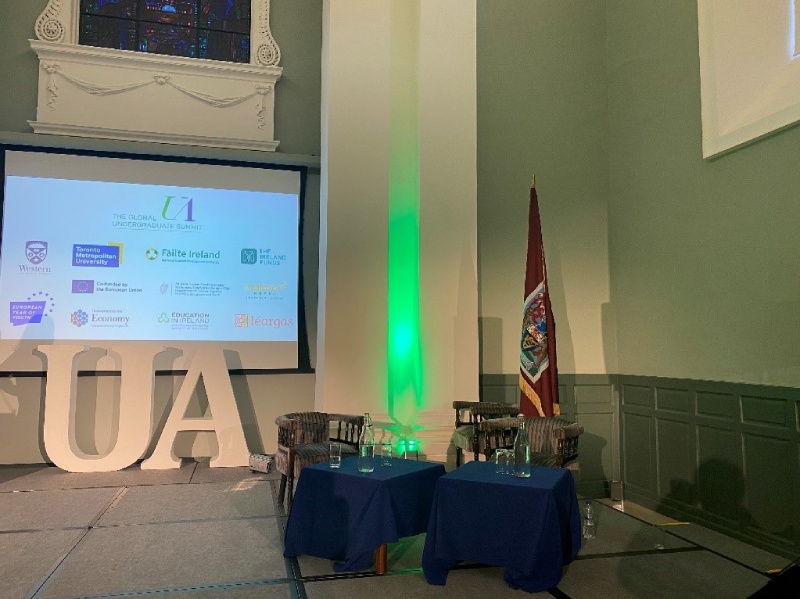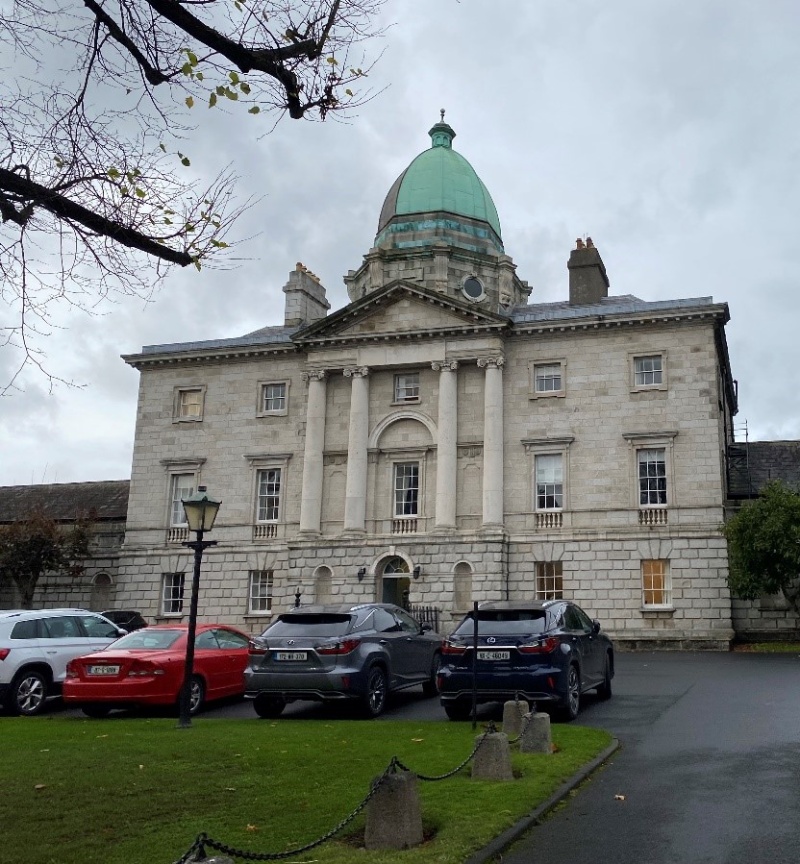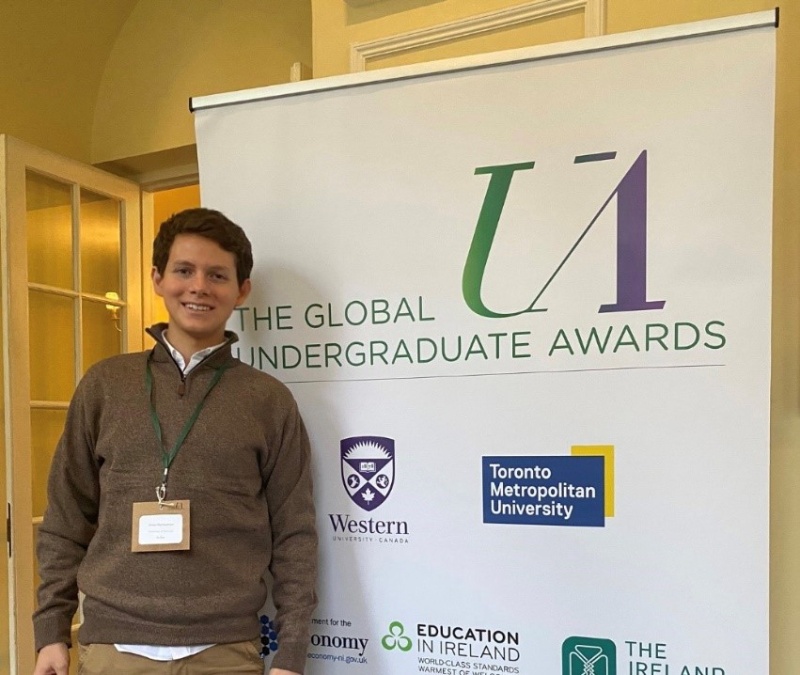Other News
Omer Manhaimer awarded the European prize for Politics and International Relations in the Global Undergraduate Awards 2022
Omer Manhaimer, who graduated in 2022 in Politics, International Studies and Quantitative Methods, won the European Global Undergraduate Award for his essay ‘Nonviolent action types and state responses: an empirical test’. Please see below for Omer’s brief description of the essay and the GA summit that brought together the winners in different categories. Very many congratulations to Omer.
Omer Manhaimer
Under the patronage of the President of Ireland, The Global Undergraduate Awards is the world’s largest undergraduate awards programme. Winning entries are selected by a panel of 640 judges from over 2,800 entries across 25 subjects. All entries must have received a mark of distinction to be eligible for submission.
Approaching the end of my degree programme—amidst essay deadlines, exams, dissertation writing, and final preparations for my graduate role—a reminder I had set eight months prior reappeared, prompting me to submit an essay to the Global Undergraduate Awards.
I graduated from University of Warwick in July 2022 with BA (Hons) Politics, International Studies and Quantitative Methods. This PAIS degree programme, run in conjunction with the Q-Step Centre, is unique within the UK social science undergraduate education landscape in its specialised focus on quantitative empirical research. I am very pleased to have been part of a university and a faculty that focus on equipping students with independent and innovative interdisciplinary research tools already at the undergraduate level.
I decided to apply for the Global Undergraduate Awards and submitted a paper that I deemed a paragon of my undergraduate writing. I had originally submitted it for my final-year module SO32Q: Applying Quantitative Methods to Social Research. My essay, "Nonviolent action types and state responses: an empirical test”, assesses the ability of nonviolent action types to explain variation in state responses to nonviolent collective action in Pakistan. In addition to addressing a geographical gap in existing literature, my study employs multinomial logistic models to address a quantitative gap in prior research. It made early findings of a relationship between non-violent action and state responses for protests and political engagement action types.

In September, I was informed that my entry was ‘Highly Commended’. This meant that it was within the top 10% of entries in the Politics and International Relations category. Two weeks later, I was delighted to be announced as European winner for this year. As winner, I was invited to attend the three-day UA Global Summit held in November in Dublin, Ireland. In addition, my paper will be published on UA’s Undergraduate Library.
The Summit was held at Blackhall Place, home to the Law Society of Ireland. During the Summit, winners had the opportunity to present their research findings. It was fascinating to learn about my peers’ innovative research in various disciplines, and exciting to see their dedication to their respective subject areas. My appreciation of interdisciplinarity has only crystallised as my fascination often turned into interesting conversations. It was great to be challenged to consider the implications of my research by those that study seemingly far-removed subjects.

In addition, we were able to listen to insights from various keynote speakers and engage in breakout workshops. The Summit also included a wine reception, a visit to the Jameson Distillery, and a Gala Dinner at King’s Inns. Attendees represented many countries and institutions, so it was great to form strong bonds with people with diverse backgrounds and perspectives. Finally, it was my first time visiting Dublin—a city with rich culture and history—which made this experience all the more enjoyable.
Winning this award is a culmination of several years of rigorous training in independent quantitative political research. To be recognised on a global scale is truly fulfilling, and I am thankful to the Global Undergraduate Awards for this opportunity. This achievement would not have come to fruition without the support of the Faculty of Social Sciences, as well as the Warwick Q-Step Centre and the Department of Politics and International Studies. Through enrichment opportunities and events, like Q-Step Masterclasses and the Research Assistant program that I was fortunate to engage with, I was constantly pushed toward academic excellence at Warwick. For that, I am very grateful.

You can learn more about the Global Undergraduate Awards on their website.
Vaccine Hesitancy & Disinformation Podcast Launch
As part of the AHRC-DFG funded project: Moral Obligation and Epistemology: The Case of Vaccine Hesitancy, we have launched a podcast series.
We will be interviewing academics in health psychology, philosophy, politics and public health, as well as professionals working in public health, government, and social media. Topics explored in the podcast include: the rationality of hesitancy, conspiracy theories, misinformation, and hesitancy among vulnerable communities.
The podcasts will appeal to academics interested in the causes of vaccine hesitancy, and in the tools and methods we can use to increase vaccine uptake.
ECPR Research Opportunities
PAIS is a member of the European Consortium for Political Research (ECPR) – here is a reminder of events, opportunities and benefits for PAIS researchers, including PhD students.
The ECPR The Joint Sessions of Workshops will be held 25 – 28 April 2023 at Sciences Po Toulouse and Online. This is an excellent intensive series of workshops on specific topics. The call for papers is now open – browse the WorkshopsLink opens in a new window and submit your proposal here by 9 January 2023.
The ECPR General Conference will be held 4 – 8 September 2023 at Charles University, Prague. The deadline for paper proposals will be 28 February 2023 (see Home - ECPR General Conference, Charles University, 4 – 8 September 2023).
There is also – just – time to register for the ECPR Winter School on Social Science Methods, to be held 6 – 11 February 2023 at KU Leuven and Online. To secure your spot: click here to browse the course list, add your chosen course to the basket, and head to checkout. The course confirmation deadline is 19 December.
Because Warwick is a full ECPR member institution, there are funding opportunities especially for research students and early career researchers – see https://ecpr.eu/Funding/Funding. The easiest way to keep up with ECPR events and opportunities is to sign up to MyECPR at https://ecpr.eu/.
Any questions, please contact Warwick and PAIS’ official representative, Michael Saward (m.j.saward@warwick.ac.uk).
Stuart Elden’s book The Archaeology of Foucault published by Polity
 Stuart Elden’s book The Archaeology of Foucault has been published by Polity.
Stuart Elden’s book The Archaeology of Foucault has been published by Polity.
On 20 May 1961 Foucault defended his two doctoral theses; on 2 December 1970 he gave his inaugural lecture at the Collège de France. Between these dates, he published four books, travelled widely, and wrote extensively on literature, the visual arts, linguistics, and philosophy. He taught both psychology and philosophy, beginning his explorations of the question of sexuality.
Weaving together analyses of published and unpublished material, this is a comprehensive study of this crucial period. As well as Foucault’s major texts, it discusses his travels to Brazil, Japan, and the USA, his time in Tunisia, and his editorial work for Critique and the complete works of Nietzsche and Bataille.
It was in this period that Foucault developed the historical-philosophical approach he called ‘archaeology’ – the elaboration of the archive – which he understood as the rules that make possible specific claims. In its detailed study of Foucault’s archive the book is itself an archaeology of Foucault in another sense, both excavation and reconstruction.
This book completes a four-volume series of major intellectual histories of Foucault. Foucault’s Last Decade was published by Polity in 2016; Foucault: The Birth of Power followed in 2017; and The Early Foucault in 2021.
Defenders of Japan: The Post-Imperial Armed Forces
Garren Mulloy is a Professor in the Faculty of International Relations and Graduate School of Asian Area Studies, Daito Bunka University, Saitama, Japan, and also teaches intensive courses on peace operations for the University of Tsukuba Business School, having previously taught at Keio University. His research has focused primarily upon Japanese security, having completed a PhD on Japan Self-Defense Forces’ (JSDF) overseas operations at Newcastle University (2011), and he has written on contemporary defence, security, diplomacy and related issues, as well as historical studies of Japan, the UK, and war memorialisation. He is currently a visiting scholar in the Faculty of Asian and Middle Eastern Studies, University of Cambridge (April 2022-March 2023), focusing primarily upon how the UK and other states and institutions engage with the Japanese Free and Open Indo-Pacific (FOIP) Vision, as well as continuing research into Japan's post-war period, memories of war, and development of defence institutions and policies. He is also researching a range of other issues, including a project with Catherine Jones (St. Andrews) and Vanessa Newby (Leiden) on Ocean Governance.
His EASG research seminar is based on his latest book: Defenders of Japan: The Post-Imperial Armed Forces, 1946-2016-A History (London: Hurst & Co., 2021). In it, he charts the development of Japan's post-imperial forces that preceded the JSDF, and the JSDF themselves as existentially challenged and unorthodox military institutions serving a civil society that decries militarism. The talk investigates how the forces developed during the Cold War, adapted to post-Cold War events, their contributions to Japanese and global security and possible reconfiguration for Japan's future security needs. The book and talk examine the internal structures and cultures of the Forces and deconstructs how the JSDF have adapted and will continue to adapt within domestic norms, caught between unresolved legacies of Japan's imperial past and a dynamically shifting balance of regional and global power.
